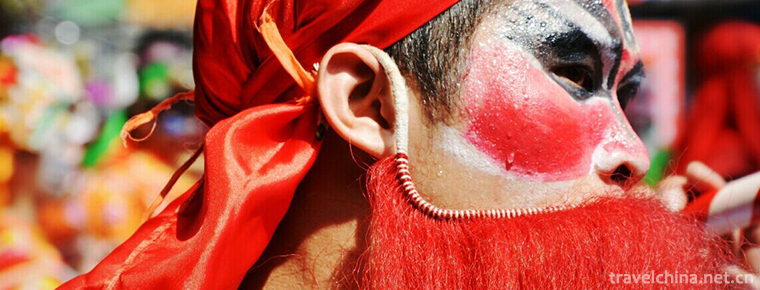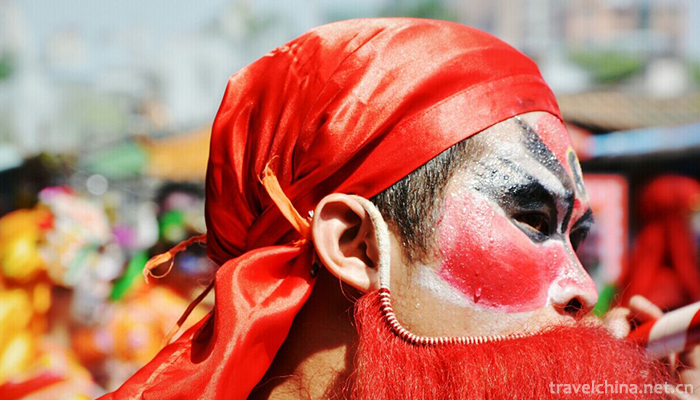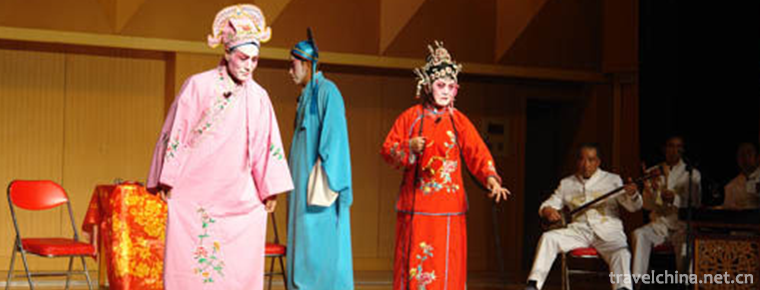2019-01-06

- By ChinaWiki.net
- Chinese Edition
- 2019-06-09
Puning Ying Song
Puning Yingge is a traditional folk dance style widely spread in Puning City, Guangdong Province. It was created and compiled by Yitang people during the reign of Qianlong in the Qing Dynasty. It has been preached to the people for more than 300 years. It is considered as a symbol of promoting positive pressure and evil, auspicious and peaceful. It is deeply loved and respected by the masses and has a broad mass and social foundation. It originated from the people's enjoyment of martial arts (learning fists) after working, so as to eliminate fatigue and build up their body. On the basis of martial arts practice, it compiled "Singing English Song" according to the story of Liangshan Po heroes attacking Daming Mansion in Song Dynasty. It was passed down from generation to generation and developed into excellent folk traditional dance in southern China.
Puning Ying Ge was awarded the first batch of national intangible cultural heritage in 2006; in 2008, as one of the representative teams of "Guangdong Literature and Art Olympic Corps", it performed in Tiananmen, Beijing, creating a warm atmosphere for the opening of the Beijing Olympic Games; in 2012, Puning Ying Ge was awarded the "Town of Chinese Folk Culture and Art" by the Ministry of Culture for the second time, and became one of 27 honorary units in Guangdong Province. In addition, Puning Ying Ge was invited to participate in the Shanghai World Expo. He also represented Guangdong Province in Beijing and Tianjin to participate in the national literary and artistic performances, which is well known in Beijing and China. He has also been interviewed by CCTV's Far Home and China Travel for many times.
Tracing to the Origin of English Songs
During the reign of Qianlong in the Qing Dynasty, Chen Chengzhi, a Yongtang native, created "English Song and Dance" on the basis of the Southern Shaolin Wushu he learned and preached to the people. Xu Yamei of Tieshan and Chen Niangkang of Dachanglong practised martial arts in the name of singing heroes in the years of Xianfeng in Qing Dynasty in order to prepare for the rebirth of volunteers. They were also the early famous heirs of Puning Ying Song.
English Song School
Allegro
Nanshan English song is the representative of Allegro English song and the most famous one of Puning's English songs. As early as 1953, Nanshan Yingge represented Guangdong to Beijing for the first national folk music and dance performance. Chen Ruipeng, an outstanding old artist at that time, served as a head hammer. Later, he trained a large number of members of the Yingge team. Chen Ruipeng, an important inheritor of the English song art, died several years ago. In 1992, the Nanshan Yingge Team was invited to participate in the Tianjin Nankai Cup Square Art Invitational Competition, and won the excellent certificate issued by the Ministry of Culture and other units. In 1991, the Nanshan Yingge Team won the highest prize in the Lingnan Folk Art Festival in Guangdong Province. Chen Laifa said that the old artists had basically died, and the present artists, such as Chen Shuyu, were more skilled, while others had their own strengths. It's easy to learn the basic movements and formation of English songs. It can be learned in a few days under the guidance of hands, but it takes years of training to really appreciate the essence of English songs.
Medium board English song
Nigou English Song is the best English Song in China and the most famous one in Puning English Song. Its skilled, frequently invited to Hong Kong and Macao, Guangzhou, Shenzhen, Chaoshan cities and towns, to add a lively atmosphere for local festivals, is very popular.
In 1953, Yingge Shangxian performed well. In the 1950s, in order to express their love for the Five-Star Red Flag, they created the "Five-Star Shining" routine, which was praised by South China Song and Dance Troupe. In December of the same year, Nigou Yingge went to the provincial capital again. The set was shot by Tianhe Stadium, a production organization of CCTV's "Southeast, Northwest and Central" and was condensed and refined. It was broadcast on CCTV for 5 minutes. Zhang Boqi of Nigou Village is the most famous medium-board English singing mallet (protagonist). She was invited to attend a meeting in Guangzhou on the intangible heritage day on June 10. Zhang Boguang, the leader of Yingge Team in Nigou, introduced the art of Yingge to reporters. Zhang Boguang, 67, has been teaching English singing skills by his uncle since he was a teenager. He says the village is handed down from generation to generation in this way. Since 1959, Zhang Boguang has been the leader of the English Song Team. He is responsible for contacting the performers and training the new members. He told reporters that according to the figures of Tiangan and Dizhi, the performance of English songs is divided into front shed, middle shed and back shed. The front shed is the most important part. The actors decorate the heroes of Liang Shanbo with oil paints. The dancers dance two wooden sticks by hand. While dancing the majestic movements, they tap wooden sticks to make strong rhythmic music.
Adagio English Song
Beishan English song has a history of more than 200 years and is the representative of Puning's slow-moving English song. Adagio English songs have a slower rhythm and use longer sticks than other genres. Beishan Yangko is also the leader of Puning's English Song, which is a major genre of Puning's English Song.
After liberation, Beishan Yingge has participated in many large-scale literary and artistic activities held by superiors. In 2007, CCTV's "Travel China" production team came to Beishan Village to shoot the Beishan Ying Song on the spot, focusing on the shooting of "Backshed" boxing and "Puma" performance. 2008 5
Month is broadcast on CCTV Channel 4 International.
During the period from Daoguang to Xianfeng in the Qing Dynasty, Xu Amei, the leader of the peasant uprising, was a famous successor. Based on the essence of the predecessor Wu Yi, Xu Amei, a representative of the village young man, combined with the Southern Boxing horse race, used the unique skills of "four door" and "big hammer" to form a unique "front plate slow" Beishan English song front shed.
Beishan English song is a hero in Puning's slow-moving English song. The Festival is also very rich. There have been many performances such as "Buddha Gong Buddha Mother", "Piggy Brother", "Peach Blossom Transition", "Village Gu weaving ramie", "Lantern Making" and so on. The content and performance style of the festival are rich in local flavor and charm. It is deeply loved by the masses and has never faded.
The most exciting part of Beishan Ying Song and Dance should be the "Dabuma" martial arts performance in the back shed. As the proverb goes, "The front shed looks at Nanshan, the back shed looks at Beishan". The backshed of Beishan Yingge song has its own characteristics, and its performing art level is different from the connotation of martial arts. Each performer holds various kinds of knives, guns, swords and halberds, forming a huge martial arts team. This team is usually composed of 16, 24 or 36 symbolic members. During the performance, there are singles, fighting, stick shooting, gun stabbing, knife, lightsaber shadow, real fighting, thrilling, exciting. Especially the final "Dabuma" show.
National Heritage
The state attaches great importance to the protection of intangible cultural heritage. On May 20, 2006, Puning Yingge was approved by the State Council to be included in the first batch of national intangible cultural heritage list.
Puning English Song is the first national intangible cultural heritage. "Puning English Song" rose in the late Ming Dynasty and early Qing Dynasty, and has been inherited for more than 300 years. According to the relevant historical records, in the late Ming Dynasty, Waijiang Opera came to Puning to perform the Han Opera of Liangshan Bo Heroes in Song Dynasty, disguised as going downhill to attack Daming Mansion. Among them, singing and dancing, moving performance, deeply loved by local farmers, so learning to play, then known as singing English songs, and later gradually deleted the part of singing and retained the part of mallet dance. The props for English singing and dancing are round wooden mallets. There is no absolute fixed number of performers. Except for the head of the team playing with snakes, the mallets are mostly 16 people, 24 people, 32 people, 36 people or 72 people, which can be more or less flexible. English singing dancers play heroes of Liang Shanbo. Therefore, dancers'facial makeup depends on their characters and personality characteristics. For example, the head mallet knife is red-faced and red-bearded; the head mallet Black Whirlwind Li Kui black beard full of cheeks, barbs; the three mallet flower monk Lu Zhishen is a flower-dotted green-eyed outlook; the four mallet Walker Wu Song describes a brilliant, strong and invincible beautiful man; the head of the team plays with fleas on the drum, with a silver ring snake on his face. The costumes of English singers and dancers are similar to those of "tight-fitting short beats" in Beijing Opera, with shoulders on the upper body and legs wrapped in zigzag.
Media Evaluation
Over the past 300 years, the traditional festivals and celebrations in Chaoshan area have been accompanied by the body-building movies of English singers and dancers. In 2006, Puning Ying Ge was listed in the first national intangible cultural heritage list by the State Council. In recent years, more and more people support Puning Ying Ge and Dance, a folk art in Chaoshan area, has gone out of villages and towns to the world.

Ask a Question
Your email address will not be published.



0 Questions